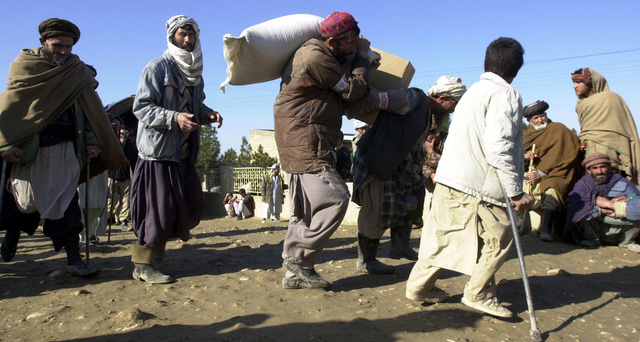On June 21, 2023, the federal government’s legislative solution to allow Canadian organizations to carry out their vital international assistance work in Afghanistan and other regions under de facto control of an entity deemed by the government to be a terrorist group, Bill C-41, received royal assent.
The version of the bill which passed into law was significantly different from the one introduced in March 2023 in the House of Commons. This includes key improvements based on recommendations from the International Civil Liberties Monitoring Group (ICLMG) and other civil society organizations. Despite these changes, the ICLMG still maintains deep concerns about aspects of the bill that undermine the provision of important forms of international assistance.
The most significant improvement was an amendment to create, for the first time, an exemption in Canada’s laws on countering terrorist financing for the provision of humanitarian assistance. This change came thanks to concerted pressure from civil society groups, and gives greater certainty to humanitarian organizations in carrying out their work; however, the government must still provide clarification on how this exemption will play out in practice.
At the same time, this exemption does not apply to many Canadian international assistance organizations that carry out vital activities, but which are not exclusively humanitarian in nature, including in regards to provision of health services, defense of human rights, efforts towards peacebuilding and support towards earning a livelihood. These organizations are now required to proceed through an unclear, burdensome and invasive authorization process.
Among other concerns, this new regime places the onus on these groups to prove they do not violate vaguely defined security assessment rules. These rules allow the Minister of Public Safety to deny an authorization based solely on whether any individual involved in a project, including international partners, has undefined “links” to terrorism or has ever been simply investigated on terrorism grounds.
The ICLMG has documented time and again how such vague rules result in harmful impacts, including: “guilt by association” based only on unsupported allegations; political interference or ministerial discretion based on political expediency; and the promulgation of both systemic and individual bias and racism.
For example, Canadian Muslim charities are disproportionately and unjustifiably investigated for links to terrorist financing, despite the lack of credible evidence and based largely on systemic Islamophobia. Any of the many people who have carried out valuable, selfless work with these charities who may wish to apply for an authorization could now face disqualification simply because of these baseless racial and religiously-motivated investigations.
There is nothing limiting the examination of “links” or “investigations” to within Canada either, meaning that designations or investigations by foreign governments and agencies, including those who more readily deem human rights defenders or political opponents as “terrorists,” could be considered in these assessments. Examples of this abound, including Israel’s designation of six well-respected Palestinian civil society organizations as “terrorist organizations” without any evidence, or the Indian and Egyptian governments’ jailing of human rights activists as “terrorists.”
Other concerns include:
- Minimal restrictions around the use of information shared between the Minister of Public Safety and nine other Canadian agencies involved in national security, including CSIS, the RCMP, the CRA and the CSE. The government can also add any other organization to the list of approved entities, including foreign security and intelligence agencies;
- Overly-broad secrecy rules for any judicial review of a rejected application, denying applicants access to the information being used to deny their application.
The ICLMG is grateful to opposition critics who raised these concerns at committee, but disappointed that they were not corrected before the bill’s adoption. The coalition will continue its work to address these problems, and calls on the government to take action to address them through regulation. The ICLMG will also be closely monitoring the implementation of the regime in order to bring concerns to the mandated one-year review of Bill C-41.
Finally, the ICLMG reiterates its concern that an exemption regime does not address the central problem at the heart of this issue: that Canada’s overly-broad counter-terrorism laws allowed for this situation to occur in the first place. The ICLMG, among others, has long raised concerns that the inherent vagueness and political nature of the word “terrorism” will continue to have unintended consequences, including on Canada’s international human rights and humanitarian obligations, evidenced by the current restrictions on the provision of aid. While an exemption regime may provide a route forward, it avoids how counter-terrorism laws create areas and entities that are considered ‘no-go,’ and continue to primarily and unjustly impact majority-Muslim countries and regions. We renew our call for the government to fundamentally revisit its approach on counter-terrorism laws and their enforcement.
The International Civil Liberties Monitoring Group, founded in 2002, is a non-partisan coalition of 44 Canadian civil society organizations from a broad range of sectors that works to defend civil liberties in the context of national security and the so-called “War on Terror.”
Since you’re here…… we have a small favour to ask. Here at ICLMG, we are working very hard to protect and promote human rights and civil liberties in the context of the so-called “war on terror” in Canada. We do not receive any financial support from any federal, provincial or municipal governments or political parties. You can become our patron on Patreon and get rewards in exchange for your support. You can give as little as $1/month (that’s only $12/year!) and you can unsubscribe at any time. Any donations will go a long way to support our work. |



